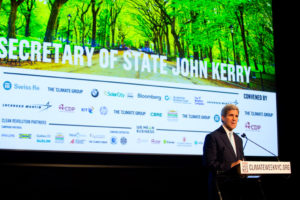by Rishika Pardikar
In May, 2020, in the midst of the COVID-19 pandemic, Amphan, a category 5 (highest level) Super Cyclonic Storm, hit eastern India and Bangladesh, leaving death and destruction in its wake. During this same period, India also had to face locust attacks and ensuing crop damage, much like other countries in Africa and the Middle East. Then came the monsoons and ensuing flooding that displaced millions in South Asia. In fact, a third of Bangladesh was under water this monsoon. But while the global pandemic was unexpected, such climate-related disasters are not uncommon in the Global South.

And so, it’s all the more shocking that the Trump administration officially withdrew the US from the Paris Agreement on 4th November, 2020. The Agreement is part of the United Nations Framework Convention on Climate Change (UNFCCC), a global environmental treaty with a central aim to strengthen global response to climate change.
The formal withdrawal follows President Trump’s announcement to do so soon after taking office in 2017.
What the withdrawal means is that the US, the biggest emitter of CO2 in all history, is the only country in the world to reject a concerted, global effort to deal with the existential threat that climate change poses. This is especially troubling given how countries in the Global South have done very little to cause the problem they now face.
On 4th November, the Bhutan Chair of the Least Developed Countries (LDCs) Group at UN Climate Change negotiations expressed disappointment at the US leaving the Paris Agreement.
During his first term in office, Trump rolled back about 70 environmental regulations and is on track to roll back another 30. Suffice it to say, such actions, alongside the withdrawal from CO2 emissions cuts as required under the Paris Agreement, could sound the death knell to global efforts aimed at environmental protection and climate change mitigation.
In COVID recovery plans too, the Trump administration showered billions of dollars on fossil fuels companies, the primary culprits in C02 emissions.
The incoming Biden administration therefore has a responsibility to both undo the damage done by the Trump administration and do more to address climate vulnerability concerns, especially in the developing world.
Avantika Goswami, the Deputy Programme Manager for Climate Change and Renewable Energy at the Centre for Science and Environment (a New Delhi-based public interest research and advocacy organization) said that the United States “is long overdue to fulfil its responsibilities towards the international climate community.” She pointed out that prior to Trump’s election, “the US was already set to miss its Paris commitment to lower carbon emissions by 26-28 per cent below 2005 levels through 2025.”
Biden’s climate plan
On his first day in office, Biden promised to rejoin the Paris Agreement. He has also indicated that other executive actions to reduce emissions are on the table, such as placing limits on methane pollution from oil and gas operations, and working towards creating 100% clean energy and zero-emissions vehicles.
Climate change has also been listed as one of four priorities of the Biden-Harris administration as part of their plan to ‘Build Back Better’.
But is this enough?
“Joe Biden’s climate plan makes some useful promises, but is nowhere near as ambitious as it needs to be,” Goswami pointed out. She explained that Biden’s $2 trillion plan “pales in comparison to plans proposed by Bernie Sanders ($16 trillion) and even Kamala Harris in her former campaign ($10 trillion).” And while Biden does outline a Net Zero target for the US, Goswami pointed out that “2050 is not an urgent enough deadline for the US to decarbonize as rapidly as the IPCC’s timeline recommends.”
On 8th November, 2020, Dr Ajay Mathur, Director General of The Energy and Resources Institute (TERI) said “India should urge the Biden administration to adopt climate change goals that place it on a path to a less than 2°C warming target.”
Currently, India is the only G-20 country whose Paris pledges for 2030 place it on a 2°C pathway, according to the Climate Action Tracker. As regards the US, the same tracker states “had the [Trump] Administration remained in the Paris Agreement, the CAT would have rated the 2025 target as “Insufficient”. However, given the Trump Administration’s decision to withdraw from the Paris Agreement, which nullifies the target, we rate the US as “Critically insufficient.”

On 23rd November, Biden named John Kerry as his special envoy for climate change, a Cabinet-level position with a seat on the National Security Council. “This marks the first time that the NSC will include an official dedicated to climate change, reflecting the president-elect’s commitment to addressing climate change as an urgent national security issue,” the Biden transition team said.
But in his very first public address since Biden’s announcement, Kerry ignored the U.S’s historical emissions and falsely said that the United States “is responsible for only 13% of global emissions.” Fact check: the US is responsible for 25% of global emissions.
What Kerry was referring to was US emissions in 2017 which was about 13%.
It is disingenuous therefore to ignore prior emissions and undermine principles of equity, given the role the US has played in contributing to the climate crisis in the world, especially in the Global South. In fact, Article 3.1 of UNFCCC highlights principles of equity and of common but differentiated responsibilities and specifically notes that industrialised countries like the US need to take the lead in combating climate change.
Kerry’s statement is a sign of “the return of US obstructionism and exceptionalism,” noted Nathan Thanki, a climate justice activist who works with Focal Point for Climate Justice groups at UNFCCC.
Even before Trump took office in 2017, the US has a history of undermining global efforts aimed at mitigating climate change. US antics during previous UNFCCC negotiations are well-established.
The Path ahead for the Biden administration
On 2nd November, just two days before the US withdrew from the Paris Agreement, the chair of an alliance of small island states wrote to the president of the next climate conference (i.e., COP26, scheduled to be held in Glasgow in November, 2021). The statement noted how the withdrawal from the Paris Agreement was not the first time that the US threatened the viability of a climate treaty. That occurred in 2001 when the George W. Bush administration refused to ratify the Kyoto Protocolon Climate Change.
“Their [the Bush administration’s] argument was that targets were not imposed on China and India,” Goswami explained. This was the same rhetoric adopted by Donald Trump who, during the presidential debate, said “Look at China. How filthy it is. Look at Russia. Look at India, it is filthy. The air is filthy.’’
As the world’s largest historical emitter of greenhouse gases and highest current per capita emitter, Goswami added, “there is no justification for the US to blame developing nations with some of the lowest per capita emissions in the world,,”
According to Thanki, the Biden-Harris Administration “has to rebuild trust especially with developing countries.” Thanki elaborated that the first step should be to gain recognition from the challenges that developing countries face in terms of low-carbon development, climate change impacts, and the huge economic and health crisis brought on by the COVID-19 pandemic.
Another area where the US needs to make a greater commitment is climate finance.
Under the Obama administration, the U.S. pledged to contribute $3 billion to the Green Climate Fund (GCF), a fund established within the UNFCCC to assist developing countries in adaptation and mitigation practices to counter climate change. But a contribution of $2 billion (above the $1 billion the Obama administration contributed toward its $3 billion pledge) is still pending. Ever since Trump took office, the US has not contributed any amount to the GCF.
The provision of such financial resources, Thankl said, would “ensure a just transition to a low carbon society everywhere.” Goswami agreed, adding that Biden “will need to step up funding to developing nations to compensate for the four years lost for meaningful climate action.”
Rishika Pardikar is a freelance journalist from Bangalore who writes regularly on environmental issues.
